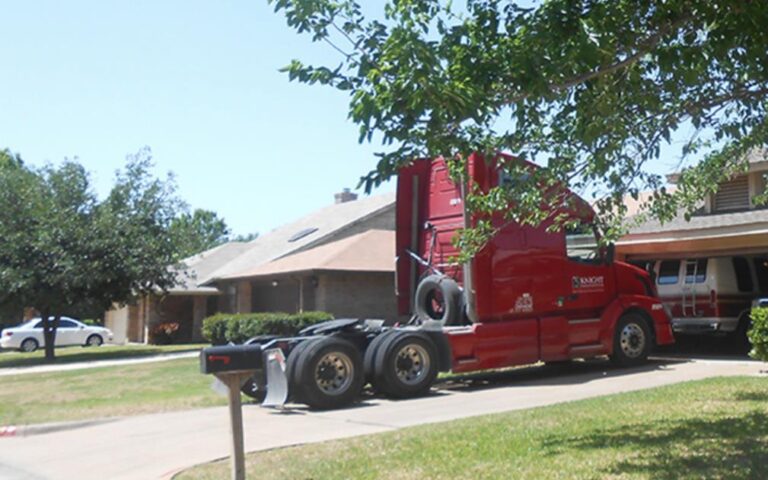How To Fix High Exhaust Temperature International Truck?
Are you looking for How To Fix High Exhaust Temperature International Truck? When operating an International truck, encountering high exhaust temperatures can be a worrying issue. It not only signifies potential engine problems but can also lead to decreased efficiency and increased wear.
Understanding the root causes and implementing effective solutions is crucial for truck owners and operators. In this comprehensive guide, we explore various strategies to fix high exhaust temperatures in International trucks.
Key Takeaways
- Identifying the causes of high exhaust temperature.
- Step-by-step solutions for common issues.
- Maintenance tips to prevent future problems.
How To Fix High Exhaust Temperature International Truck?
Fixing high exhaust temperature in an International truck involves several steps, each addressing different potential causes of the problem. Here’s a detailed guide:

- Diagnostic Check:
- Description: Begin with a thorough diagnostic check using an OBD-II scanner. This step can help identify any error codes related to the exhaust system or engine performance.
- Action: Connect the scanner to the truck’s diagnostic port and run a full scan. Note any error codes and investigate their specific meanings and implications.
- Inspecting the Air Filter:
- Description: A clogged air filter can restrict airflow, leading to inefficient combustion and high exhaust temperatures.
- Action: Check the air filter for dirt, debris, or damage. Replace it if necessary. Ensure the new filter is properly seated and secured.
- Checking the Exhaust Gas Recirculation (EGR) System:
- Description: The EGR system helps lower exhaust temperatures by recirculating a portion of the exhaust gases back into the engine. A malfunctioning EGR can cause high temperatures.
- Action: Inspect the EGR valve and its related components. Clean any carbon buildup and check for proper operation. Replace any faulty parts.
- Examining the Turbocharger:
- Description: Turbocharger issues can contribute to high exhaust temperatures by affecting the engine’s air intake and combustion efficiency.
- Action: Inspect the turbocharger for signs of oil leaks, damage, or blockages. Ensure the turbocharger blades spin freely and there are no obstructions in the air intake paths.
- Fuel System Evaluation:
- Description: Problems in the fuel system, like poor fuel quality or incorrect injection timing, can lead to high exhaust temperatures.
- Action: Check the fuel filters and replace them if they are clogged. Inspect the fuel injectors for proper operation and timing. Ensure the fuel quality is up to standard.
- Cooling System Check:
- Description: The engine’s cooling system plays a vital role in maintaining optimal operating temperatures.
- Action: Inspect the coolant level and condition. Check for leaks in the cooling system, including the radiator, hoses, and water pump. Ensure the thermostat is working correctly.
- Exhaust System Inspection:
- Description: A restricted or damaged exhaust system can cause backpressure, leading to higher exhaust temperatures.
- Action: Inspect the exhaust manifold, pipes, and muffler for blockages, leaks, or damage. Ensure the exhaust system is free of obstructions and in good condition.
- Software Updates:
- Description: Outdated engine control software can affect engine performance and exhaust temperature regulation.
- Action: Check with a certified International truck service center for any available software updates for the engine control module (ECM).
- Professional Consultation:
- Description: Sometimes, the issue might be beyond basic troubleshooting.
- Action: If the above steps don’t resolve the problem, consult with a professional mechanic specializing in International trucks. They can provide advanced diagnostics and repairs.
Identifying the Causes of High Exhaust Temperature
Before diving into solutions, it’s essential to understand what causes high exhaust temperatures. Common reasons include clogged air filters, malfunctioning exhaust gas recirculation (EGR) systems, and turbocharger issues. Regular maintenance is key to preventing these problems.
Common Causes
- Clogged Air Filters: Reduced airflow can increase exhaust temperatures.
- Faulty EGR System: A malfunctioning EGR can lead to inefficient combustion.
- Turbocharger Problems: Issues with the turbocharger can cause temperature spikes.
Step-by-Step Solutions
Once you’ve identified the cause, you can begin addressing the problem. Here are detailed solutions for each common cause.
Fixing Clogged Air Filters
- Inspect the air filter regularly.
- Replace the filter if it’s visibly dirty or damaged.
- Ensure proper installation to avoid air leaks.
Addressing EGR System Malfunctions
- Check for any EGR system codes using a diagnostic tool.
- Clean or replace the EGR valve if necessary.
- Ensure all EGR system components are functioning correctly.
Preventive Maintenance Tips
Preventive maintenance is crucial in avoiding high exhaust temperatures. Regular checks and timely interventions can save both time and money.

Regular Inspection and Servicing
- Air Filter Checks: Inspect and replace air filters as needed.
- EGR System Maintenance: Regularly clean and check the EGR system.
Advanced Diagnostics and Repairs
In some cases, advanced diagnostics and repairs might be necessary. This includes checking the engine’s fuel system and inspecting the turbocharger for any signs of wear or damage.
Fuel System Check
- Ensure proper fuel delivery and injection timing.
- Regularly replace fuel filters and inspect for leaks.
Turbocharger Inspection
- Check for any signs of oil leakage or damage.
- Ensure the turbocharger is spinning freely and without obstruction.
Upgrading Components for Better Performance
Sometimes, upgrading certain components can help in reducing high exhaust temperatures. This includes high-flow air filters and improved EGR systems.
High-Flow Air Filters
- Use high-quality, high-flow air filters for better air intake.
- Regularly clean and maintain these filters for optimal performance.
Enhanced EGR Systems
- Consider upgrading to a more efficient EGR system.
- Regular maintenance of the EGR system is vital.
What To Do When Truck Says High Exhaust Temperature?
When your truck displays a high exhaust temperature warning, it’s important to take immediate action to prevent potential damage. Initially, reduce your speed and assess whether there are other signs of malfunction, such as strange engine noises or visible smoke.
If safe, continue driving to a service station or pull over and call for roadside assistance. Avoid shutting off the engine immediately, as this can prevent the truck’s built-in cooling processes from working effectively.

Once at a service center, have the truck thoroughly inspected by professionals. They will check critical components like the exhaust gas recirculation (EGR) system, air filters, and turbocharger for issues. It’s essential to address the root cause promptly to avoid more severe damage.
What Causes High Exhaust Temperatures In Diesel Engines?
High exhaust temperatures in diesel engines are typically caused by a range of issues. One common cause is a clogged air filter, which restricts the airflow into the engine, leading to inefficient combustion and increased temperatures.
Problems with the EGR system, which is designed to recirculate a portion of the exhaust gases back into the engine cylinders, can also cause high temperatures. If the EGR system is malfunctioning, it can lead to an imbalance in the air-to-fuel ratio, causing the engine to run hotter.

Additionally, issues with the turbocharger, such as leaks or blockages, can result in higher exhaust temperatures. Finally, incorrect fuel injection timing or problems with the fuel quality can also contribute to this issue, as they can lead to incomplete or inefficient combustion.
What Is The High Exhaust System Temperature For A Semi Truck?
The high exhaust system temperature for a semi-truck generally depends on the specific model and engine type. However, most modern semi-trucks are equipped with exhaust systems that can handle temperatures up to approximately 1,000 degrees Fahrenheit under normal operating conditions.
It’s important to note that this figure can vary significantly based on the truck’s workload, ambient conditions, and the health of its engine and exhaust systems. If a truck’s exhaust temperature consistently exceeds this range, it’s a clear indication of an underlying problem.
High exhaust temperatures can be a sign of issues such as inefficient combustion, clogged filters, or malfunctioning engine components. Regular maintenance and prompt attention to any warning signs are crucial to ensuring that the exhaust temperature stays within a safe and manageable range.
Conclusion
Fixing high exhaust temperatures in International trucks requires a comprehensive approach, encompassing everything from basic maintenance to advanced diagnostics.
Regular checks, timely repairs, and upgrades when necessary can greatly reduce the risk of high exhaust temperatures. By following these guidelines and solutions, truck owners and operators can ensure their vehicles operate efficiently and safely.
People Also Ask
Can upgrading the exhaust system help reduce high exhaust temperatures?
Yes, upgrading to a high-efficiency exhaust system can improve exhaust flow and cooling, thereby reducing temperatures. However, it’s important to choose compatible upgrades specific to your truck’s model.
What are the risks of ignoring high exhaust temperatures in International trucks?
Ignoring high exhaust temperatures can lead to engine damage, increased fuel consumption, and potentially hazardous situations. It can also lead to costly repairs if not addressed promptly.
Can high exhaust temperatures be a sign of fuel system problems?
Yes, issues with the fuel system, like improper injection timing or clogged fuel filters, can lead to incomplete combustion, causing high exhaust temperatures. Regular checks and maintenance of the fuel system are essential.
What maintenance practices can prevent high exhaust temperatures?
Regular maintenance should include checking air filters, inspecting the EGR and turbocharger systems, monitoring exhaust system integrity, and ensuring proper fuel quality. Consistent maintenance can significantly reduce the risk of high exhaust temperatures.

Welcome to the exhilarating world of Matt Rex, a professional car racer turned renowned vehicle enthusiast. Immerse yourself in his captivating blog as he shares heart-pounding adventures, expert reviews, and valuable insights on cars, trucks, jets, and more. Fuel your passion for speed and discover the beauty of vehicles through Matt’s engaging stories and meticulous expertise. Join the ever-growing community of enthusiasts who find inspiration and expert advice in Matt Rex’s blog—a digital hub where the thrill of speed meets the pursuit of knowledge.






